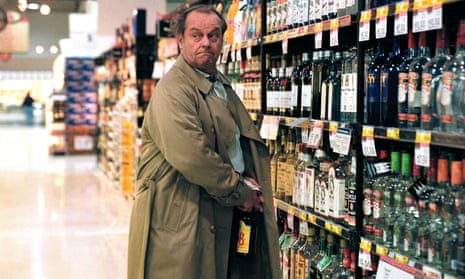Sublimely funny and exquisitely sad, this might just turn out to be an American classic. When I saw it first last year, I promised to uncork a jeroboam of superlatives for its UK release. Now I think only a nebuchadnezzar will do – or maybe an industrial-sized vat. Alexander Payne’s tragi-comedy, about a 66-year-old insurance executive who enters a twilit night of the soul on his wife’s death, is pitch-perfect in its melancholy, its broad comedy, its compassionate assessment of America’s can-do civic values and the muddled, unassuming decency of the suburban midwest, under whose vast skies our hero tries to come to terms with what, if anything, his life has been about.
Jack Nicholson gives a very gamey, ripe and irresistible performance as Warren Schmidt, a widower and retired actuary in Omaha, Nebraska. This is the setting of Payne’s earlier film, Election, and in a way its terrible sadness and disappointment with life bookends the warped, thwarted ambition of the teenagers in that high-school comedy. The sprightly orchestral score by Rolfe Kent is very similar to his music for Election; there are other unmistakable stylistic touches from Payne too. Schmidt’s heart-breakingly meagre achievements, recorded in his office in-house newsletter, are just like Reese Witherspoon’s array of talents in the school yearbook - only very much without her bright-eyed sense that life is just beginning.
The movie begins with the retirement dinner dutifully thrown for Schmidt by his employers, an excruciating affair of insincere politeness which for Schmidt is like attending his own funeral. This is to be a mirror-image of the wedding reception at the film’s very end, at which the gloomy and saturnine Schmidt, unable to voice his loathing of the man his daughter is going to marry, is overwhelmed with futility and the awful realisation that the life-cycle of deception and disappointment is starting all over again.
Sponsoring a disadvantaged six-year-old boy in Tanzania is the one thing that cantankerous Schmidt has found to do with himself in his retirement, having been encouraged by the charity to include a letter of personal news with his monthly $22 cheque. It is a brilliant device for allowing Schmidt regular voiceover soliloquies, addressed to a poignantly uncomprehending little boy on the other side of the world, about the rage and fear and loneliness he feels at being all alone. It is the first time he has thought about his feelings in all his life. That bleak, gravelly voice saying “Dear Ndugu...” and then spilling his guts is one of the funniest things I have ever heard in the cinema. And the sign-off at the end of his first letter is a laugh-line with a sledgehammer punch.
It is in these letters that he discloses that he in fact hates his sweet, elderly wife - a confession all the more shocking and hilarious because she is at that point still alive. Among other things, she makes him sit down on the lavatory to urinate. (The sight of Jack Nicholson obediently doing this is an awe-inspiring climacteric in his career.) After she is dead, Schmidt addresses her spirit in the starry heavens and asks if she was too polite to tell him how disappointed she was in him for being a failure. So in a last-ditch attempt to salvage something from his wretchedly banal life, Schmidt journeys to Denver in his Winnebago camper-van with a mission to sabotage his daughter’s engagement to a ghastly waterbed salesman. About Schmidt becomes a road movie of culpable despair and dishonour.
Jack Nicholson is great almost in spite of himself. You can see that he is keeping that great, lionised, heavy-lidded mask of a face under control and forcing from it new expressions. He has described this performance as the most lacking in egotism he has given. I’m not sure that’s exactly true, but his laconic description of Alexander Payne - “Boy’s got a mind of his own” - indicates that this was a much more insistent director than Nicholson is used to. Payne has dynamited the strata of mannerisms and crazy-laughing-man tics that have settled and solidified on Nicholson over the years and found something molten underneath. The resulting portrayal of an angry, depressed old man has something of Willy Loman, of Walter Matthau in Kotch, a little of Spencer Tracy in Father of the Bride and perhaps the old man at the end of Ozu’s Tokyo Story, enigmatically unmoved by his aged wife’s death. It is certainly a classic comic performance, beautifully complemented by Hope Davis as his exasperated daughter Jeannie, Kathy Bates as her bohemian-trash prospective mother-in-law, and Dermot Mulroney, unrecognisable from his other bridegroom role in My Best Friend’s Wedding.
What is extraordinary about Payne’s film is the way it combines the most deliciously extreme and nihilist black comedy with forthright sentimentality - and somehow makes the combination work. However grisly the situations are, simply laughing at Schmidt is never the right reaction. Opinions will vary about the final two minutes of this movie, when Schmidt receives his first letter back from Tanzania. It took nerve for Payne to declaim such a big emotional finish, but I submitted wholeheartedly to its trumpet-blast of defiant non-irony, in which those deep old-man wrinkles around Schmidt’s eyes, which he told Ndugu he hated so much, become the tracks of his tears. A little rich for many palates, yes. But for me it was a gloriously satisfying, resounding major chord. Alexander Payne has created a tender, acrid, comic masterpiece.
